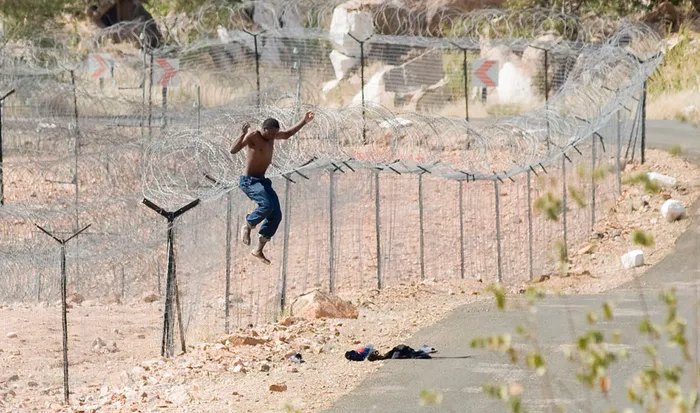Modern-Day Slavery in Pakistan’s Brick Kilns Sparks Global Concern: Lessons for South Africa
UNDOCUMENTED MIGRANTS

The echoes of Pakistan’s crisis can be heard at home — among farm workers in the Western Cape, domestic workers across Gauteng, and undocumented migrants labouring in construction, security, and mining.
Image: Henk Kruger
Reminding us that slavery is far from a thing of the past, a new report by Pakistan’s National Commission for Human Rights (NCHR) has shed light on the appalling conditions faced by tens of thousands of workers trapped in bonded labour across the country’s brick kiln industry.
Described by experts as “modern-day slavery,” the findings have sparked outrage, raising serious questions not only about Pakistan’s labour practices but also about the global failure to protect vulnerable workers — including in countries like South Africa.
The NCHR study, conducted in the industrial districts of Faisalabad and Kasur, documents a system of deeply entrenched exploitation.
According to the report, 97% of brick kiln workers had been forced into the sector due to urgent financial need, typically accepting small loans that spiral into lifelong debt. Without written contracts, 90% of them exist entirely outside the purview of labour laws.
Hazardous conditions mark their days, pitiful wages — well below legal minimums — and constant abuse.
Children are not spared. Many are pressed into labour from a young age, robbed of an education and thrust into the same unyielding cycle of poverty and servitude. Most families live in overcrowded one-room dwellings, surrounded by dust and danger, with little access to health care, safety, or basic dignity.
The report further highlights widespread physical abuse, with some workers reporting beatings, torture, abductions, and even murder. Women, in particular, face a double burden: alongside brutal working conditions, they endure sexual harassment, forced marriages, and gender-based violence on a terrifying scale.
While over 2,300 families have reportedly been rescued from these conditions, the NCHR chairperson noted that this represents just a fraction of those trapped in bondage. “This is not charity — it is justice,” she said, calling on the Pakistani government to treat the crisis as a constitutional and moral obligation, not a public relations challenge.
A Mirror for South Africa
Though these abuses are taking place thousands of kilometres away, South Africa should not turn a blind eye. The echoes of Pakistan’s crisis can be heard at home — among farm workers in the Western Cape, domestic workers across Gauteng, and undocumented migrants labouring in construction, security, and mining.
Bonded labour, while not as visibly widespread in South Africa as in Pakistan’s kilns, takes many insidious forms. Illegal deductions, withheld wages, debt cycles, and undocumented employment remain common in parts of the informal economy. Migrant workers from Zimbabwe, Malawi, and Mozambique, in particular, often find themselves trapped by their precarious legal status, with little to no recourse when exploited.
Furthermore, South Africa’s Commission for Gender Equality and other watchdogs have repeatedly raised concerns about the mistreatment of women in sectors like domestic work and agriculture — parallels that mirror the vulnerabilities exposed in Pakistan.
“The NCHR report should serve as a wake-up call,” says Dr Thandi Mokoena, a Johannesburg-based labour rights advocate. “While we may not have brick kilns, we have vineyards, factories, and households where exploitation festers under the radar. South Africa must confront the fact that modern-day slavery isn’t just happening 'over there.'”
Government Complicity and Inaction
One of the most chilling aspects of the NCHR’s findings is the complicity of the very institutions meant to protect workers. Local officials, law enforcement, and political networks are often found shielding exploiters instead of holding them accountable. This same pattern of institutional neglect is disturbingly familiar in South Africa, where labour inspectors are few and far between, and prosecutions for exploitative labour practices are rare.
The South African government has passed progressive legislation, including the Labour Relations Act, the Basic Conditions of Employment Act, and the Employment Equity Act, among others—but enforcement remains its Achilles’ heel.
For example, in 2023, a Department of Employment and Labour report found that only 15% of farms inspected in the Free State complied with basic labour standards.
Activists argue that real progress will only come when laws are enforced with the same urgency as they are passed. “We need political will, not just policy,” says Mokoena. “As long as employers can act with impunity, the system remains rigged against the worker.”
What Needs to Change?
Pakistan’s NCHR has called for a multi-pronged response: rigorous enforcement of existing laws, the strengthening of labour inspections, the creation of rehabilitation schemes for freed families, and access to microcredit to break the cycle of debt. South Africa would do well to heed this advice.
In both countries, the pathway to justice lies not just in liberation from bondage, but in the provision of real alternatives — education for children, social protection for families, and safe, fairly paid employment for adults. Without these, the chains may be broken, but the poverty trap remains.
The global community also has a role to play. International buyers who benefit from cheap labour— whether in bricks, textiles, or fruit — must be held accountable. Ethical sourcing, supply chain transparency, and labour audits should be non-negotiable.
A Global Fight for Human Dignity
The NCHR’s report is more than a condemnation of Pakistan’s brick kilns — it is a powerful reminder that slavery, in all its forms, is alive and thriving in our modern world. Whether in South Asia or Southern Africa, the fight for workers' rights is far from over. It is a fight not just for fair wages, but for human dignity, agency, and justice.
Until every worker can labour freely and safely, without fear or coercion, the promise of democracy and human rights remains unfulfilled. South Africa must reflect: are we doing enough, or are we also looking the other way?